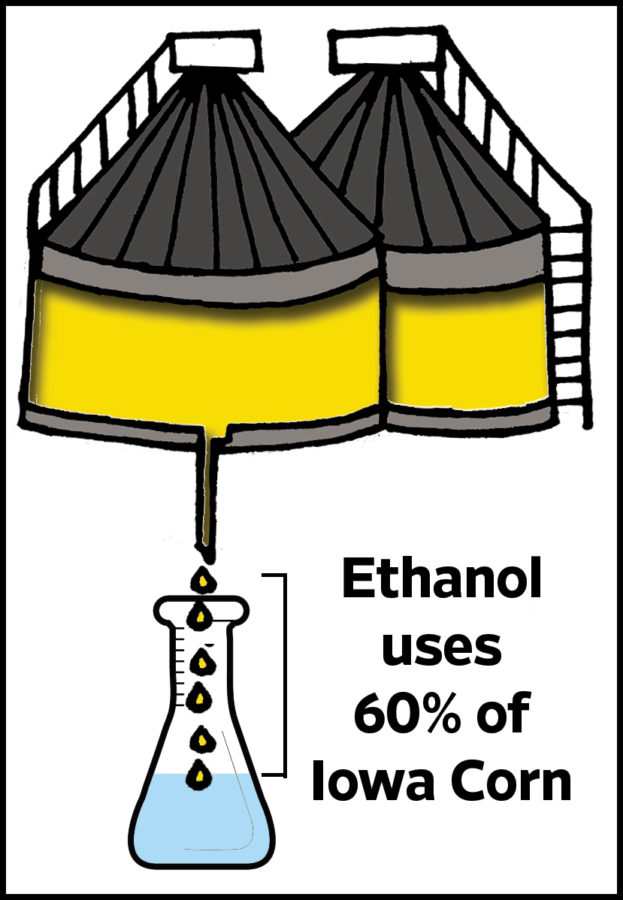Proper grain storage stays key to combating problems from 2013 growing season
Corn is a very important resource. In the creation of ethanol, 60 percent of its component is Iowa corn.
October 24, 2013
Because this year has been challenging for farmers’ grain crop, proper grain storage is needed to help preserve the crop and keep it from going to waste, said Charles Hurburgh, professor of agricultural and biosystems engineering.
The planting season for Iowa typically starts at the beginning of May. However, due to the late winter, planting did not begin until the end of May and early June in Iowa. 2013 was the latest planting on record, Hurburgh said.
This summer was too hot and too dry for the crop, which caused more problems.
“Basically the crop died early,” said Hurburgh. “This year’s growing conditions made it very tough.”
The major issue with the crop from this season is the variety of moisture levels. This makes storing the corn complicated, Hurburgh said.
When it comes to storing the corn, Hurburgh said farmers, to the best of their ability, should not mix their corn with different moisture levels of the crop.
Not all farmers will end up storing their crops.
“Farmers are in three camps here,” said Chad Hart, associate professor of economics.
Some farmers have grain bins on their farms, while other farmers use grain elevators to store their grain elsewhere. Then there is the group of farmers who do not store their grain at all, or sell it at harvest.
Many farmers will be asking themselves questions to figure out what action they will take with their crop this year, Hart said.
“Is the price high enough to cover the cost of me storing it, and am I willing to spend the time to maintain the crop if I store it?” Hart said.
Hurburgh said farmers will need to take precautions about the condition of the corn in storage.
“The conditions in the bin are going to change more rapidly than you expect,” Hurburgh said.
Temperature is the key to maintaining the corn. Farmers will want to keep their corn cold, and always know what the temperature of it is, Hurburgh said.
There will be consequences to not closely monitoring the corn.
“Once you smell it, it’s probably a bit too late,” Hurburgh said about corn quality.
Proper grain storage is necessary for the corn industry in Iowa.
“We don’t export much corn out of Iowa,” Hurburgh said.
The corn grown here is used for ethanol, feeding animals, and other purposes.
“We have one industry that uses 60 to 70 percent of Iowa’s corn: ethanol,” Hurburgh said.
Ethanol is a fermentation, so not having quality corn could ruin the ethanol process.
Farmers will have to be more alert about their corn storage because they they did not have to worry about fermentation in the past, Hart said.
Last year’s crop did better because of the weather, Hurburgh said.
“It is all in the timing of the heat in the growing season and the rain in the growing season,” Hurburgh said.
While maintaining the crop in storage will present its fair share of challenges in the following months, Hart says the benefits will far outweigh the costs.







